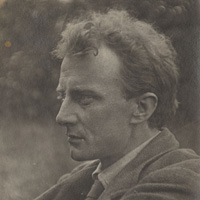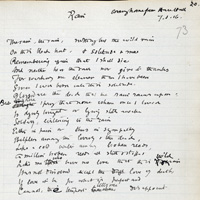The Edward Thomas Collection
‘If the war goes on I believe I shall find myself a sort of Englishman, though neither poet or soldier’
Letter to Walter de la Mare, 30th August 1914
on this page

Biography
Edward Thomas (1878–1917)
Philip Edward Thomas was born in Lambeth, London in 1878, of Welsh descent. He was educated at St Paul's college and then Lincoln College at Oxford University, where he studied history. A prolific writer of prose (including biographies of Richard Jefferies, Swinburne, and Keats), and a moderately successful journalist, his work concentrated on the image of England and the countryside. Thomas suffered from severe bouts of depression and recurrent psychological breakdowns, feeling creatively repressed by the endless reviews and ill-paid commissions he had to do to support himself and his family. Although happier with his writings on countryside that mixed observation, information, literary criticism, self-reflection and portraiture, Thomas still felt that his style was not original enough to merit recognition and struggled to find a form which suited him. It was only after a meeting with Robert Frost, the American poet, in 1913 that he devoted himself fully to the medium of poetry. From 1914 the First World War became a shifting presence in Thomas’ poetry, acting to concentrate his mind on a vision of England, leading him to write ‘war poetry’ long before he reached the trenches.

His poetry also acted as the ‘metaphysical counterpart’ to his decision to join the army (Longley, 2008, 18). After what Thomas described as ‘the natural culmination of a long series of moods & thoughts’ (a letter to Gordon Bottomley) he enlisted in 1915 with the Artists' Rifles as a private. Thomas was sent to Hare Hall Camp at Romford, Essex, where he worked as a map-reading instructor and was promoted to lance-corporal, then full corporal. Given his age, Thomas could have honourably remained in this post throughout the War, however in September 1916 he began training in the Royal Garrison Artillery and when he was commissioned second lieutenant in November he volunteered for service overseas. Thomas left England for France in January 1917 and served with no. 244 siege battery. On the 9th April Thomas was killed by a shell blast in the first hour of the Battle of Arras at an observation post whilst directing fire. Thomas wrote no poetry that we know of during his time in France, however his small pocket diary shows him to be a changed man, an efficient officer and a prolific energised writer.
Thomas is buried in Agny military cemetery on the outskirts of Arras. He was survived by his wife Helen and three children, Bronwen, Merfyn and Myfanwy. Thomas did not live to see Poems (1917), published under his pseudonym, Edward Eastaway. In just under two years he had written over 140 poems.
| Author | Kate Lindsay |
|---|---|
| Sources |
|
Search the Edward Thomas Collection
Find a specific poem by its title
Find a specific poem by its first line
Find other items
- Correspondence from Edward Thomas
- Correspondence to Edward Thomas
- Photographs of Edward Thomas
- Official documents (e.g. service records) relating to Edward Thomas
- The War Diary of Edward Thomas
- Archival Holdings:
- The Edward Thomas Collection, Cardiff University Library
- MS 22920A, The National Library of Wales
- MS 23077C, The National Library of Wales
- MS 22921A, The National Library of Wales
- MS Don d.28, The Bodleian Library, The University of Oxford
- MS 44990, The British Library
- Items from the Thomas Family private collection


